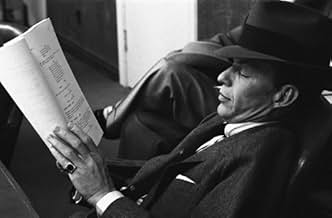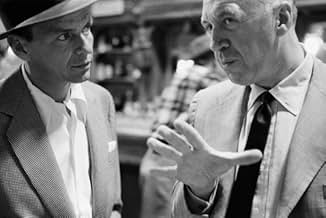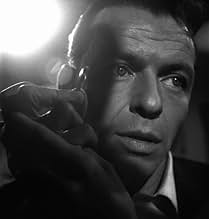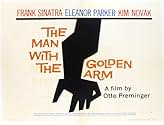A junkie must face his true self to kick his drug addiction.A junkie must face his true self to kick his drug addiction.A junkie must face his true self to kick his drug addiction.
- Nominated for 3 Oscars
- 3 wins & 8 nominations total
Jered Barclay
- Junkie in Lock-Up
- (uncredited)
Leonard Bremen
- Cabbie in Lock-Up
- (uncredited)
Paul E. Burns
- Suspenders in Lock-Up
- (uncredited)
Pete Candoli
- Jazz Musician
- (uncredited)
Herschel Graham
- Club Safari Patron
- (uncredited)
Harold 'Tommy' Hart
- Officer Kvorka
- (uncredited)
Featured reviews
A solid drama to begin with, "The Man With the Golden Arm" is particularly worthwhile for Frank Sinatra's performance as Frankie Machine. The movie was well-conceived, and it would probably have been worth seeing with any decent lead, but Sinatra makes it even better. The story is interesting and at times compelling, as Frankie struggles against himself and his circumstances.
The story is told from the viewpoint of its era, yet the basic elements are timeless enough that the story still holds up very well. The details of Frankie's situation are less important than the general themes of him battling his own desires while also contending against "friends" who simply want to use him for their own purposes.
Sinatra was good at this kind of role, as a character with his own inner demons who must also face hostile surroundings. He channels his nervous energy into expressions and gestures that convey well what is going on inside him. The actor Sinatra deserves to be remembered for roles like this one and his roles in "The Manchurian Candidate" and "From Here to Eternity", rather than for the insubstantial 'Rat Pack' features.
The supporting cast have simpler roles, but they do their jobs satisfactorily. The story moves at a good pace, and it is complemented by an Elmer Bernstein score which, though sometimes jarring, is appropriate. The combination works well as a whole.
The story is told from the viewpoint of its era, yet the basic elements are timeless enough that the story still holds up very well. The details of Frankie's situation are less important than the general themes of him battling his own desires while also contending against "friends" who simply want to use him for their own purposes.
Sinatra was good at this kind of role, as a character with his own inner demons who must also face hostile surroundings. He channels his nervous energy into expressions and gestures that convey well what is going on inside him. The actor Sinatra deserves to be remembered for roles like this one and his roles in "The Manchurian Candidate" and "From Here to Eternity", rather than for the insubstantial 'Rat Pack' features.
The supporting cast have simpler roles, but they do their jobs satisfactorily. The story moves at a good pace, and it is complemented by an Elmer Bernstein score which, though sometimes jarring, is appropriate. The combination works well as a whole.
A strung-out junkie (Frank Sinatra) deals with daily demoralizing drug addiction while crippled wife (Eleanor Parker) and card sharks continue to pull him down.
While this is not the first film to deal with drugs, it is probably the first to deal with them in a very serious manner. "Reefer Madness" and "Cocaine Fiends", for example, can be written off as humorous nostalgia. This film, on the other hand, is decades ahead of "Trainspotting" and "Requiem For a Dream". (Did you even know heroin addiction was prominent in the 1950s?)
Variety called the film "a gripping, fascinating film, expertly produced and directed and performed with marked conviction by Frank Sinatra as the drug slave." I agree for the most part, though I really did not enjoy Sinatra's acting as much as many others did, I think. Otto Preminger is a first-rate director, and I hope this film gets the respect it deserves over the long run (I found the 50th anniversary release to be not nearly cleaned up enough).
While the focus is heroin and addiction, one could also make a case about this film being about love. Frankie's wife brings him down, encourages him to go back to his old habits, turns him away from his dreams. Molly (Kim Novak) does just the opposite. Divorce and adultery are hardly ever positive topics, but in this film you almost hope that Frankie goes that route.
While this is not the first film to deal with drugs, it is probably the first to deal with them in a very serious manner. "Reefer Madness" and "Cocaine Fiends", for example, can be written off as humorous nostalgia. This film, on the other hand, is decades ahead of "Trainspotting" and "Requiem For a Dream". (Did you even know heroin addiction was prominent in the 1950s?)
Variety called the film "a gripping, fascinating film, expertly produced and directed and performed with marked conviction by Frank Sinatra as the drug slave." I agree for the most part, though I really did not enjoy Sinatra's acting as much as many others did, I think. Otto Preminger is a first-rate director, and I hope this film gets the respect it deserves over the long run (I found the 50th anniversary release to be not nearly cleaned up enough).
While the focus is heroin and addiction, one could also make a case about this film being about love. Frankie's wife brings him down, encourages him to go back to his old habits, turns him away from his dreams. Molly (Kim Novak) does just the opposite. Divorce and adultery are hardly ever positive topics, but in this film you almost hope that Frankie goes that route.
The Man with the Golden Arm was one of the first films to have as its main topic (and, in some respects, the message) the tragedy of heroin addiction. It's nowhere near a great film, but its importance lies in Otto Preminger's dedication to making it feel real and on the edge of melodrama and naturalism. What I liked is that it's not so much an expose of junkies (if you want the best expose of that read Naked Lunch, if you can get through it anyway, besides the point), but the nature of the urban environment Frankie Machine lives. He expects after he gets out of prison for dealing to go on the straight and narrow, to become a drummer in a band and make it legit as a musician. But he has his "crippled" wife Zosch, who can't work and needs money and often complains, and then there's the old neighborhood- he can't escape seeing Louie (Darren McGavin), who is still doing back-room card games and, yes, pushing dope. Like Mean Streets, it's hard to escape the minutia unless you leave.
But then again, it's hard for Frankie Machine not to try and operate naturally in this urban quarter. It's just that he can't escape the temptation of junk (when he's booked on a phony theft charge with his friend, he sees a junkie freaking out, and it puts back the fear of going back on into his clean self). And personifying Frankie is Sinatra, and I can't see anyone else who could've played him, even original choice Brando. He fits into the neighborhood, and seems like the kind of guy who should be a step ahead of the game. But there's also a vulnerability to Sinatra that he pulls out wonderfully, and by the time we see him going 'cold turkey' in Molly's apartment, it's believable even if it's not the kind of thing those from 'my' generation would think of heroin (i.e. Trainspotting and certainly Requiem for a Dream). If for nothing else, you want to watch the movie to see what happens to Sinatra as this character.
The flaws, however, come in some of the other performances, though it's a little tricky. Eleanor Parker seems to be overacting for a good portion of the movie, fooling Frankie that she's really crippled when in reality she can walk and is fooling him for one reason or another. But then it becomes clearer as it goes along- she's supposed to be nuts, and nuts with jealousy, and on that level it starts to get better. Meanwhile, Kim Novak is good, though not Vertigo-worthy, as the possible girl in the side but more like the voice of reason in the story. Then there's a Detective Bendar, who might be one of the most one-note characters/performances, ever. And also Sparrow, Frankie's nerdy friend, and the characters of Louie and Schiefka, and they're all played as one might expect them to (actually, McGavin is better than OK). As far as casting other talent around Sinatra, Preminger doesn't do all that great. And, frankly, some scenes kind of fall flat.
But there's a lot of fascination in the Man with the Golden Arm, and not just as some dated piece of sociological interest. It works as compelling drama, and as a message piece conveyed without being preachy or campy. It's a genuine article, just not exceptional.
But then again, it's hard for Frankie Machine not to try and operate naturally in this urban quarter. It's just that he can't escape the temptation of junk (when he's booked on a phony theft charge with his friend, he sees a junkie freaking out, and it puts back the fear of going back on into his clean self). And personifying Frankie is Sinatra, and I can't see anyone else who could've played him, even original choice Brando. He fits into the neighborhood, and seems like the kind of guy who should be a step ahead of the game. But there's also a vulnerability to Sinatra that he pulls out wonderfully, and by the time we see him going 'cold turkey' in Molly's apartment, it's believable even if it's not the kind of thing those from 'my' generation would think of heroin (i.e. Trainspotting and certainly Requiem for a Dream). If for nothing else, you want to watch the movie to see what happens to Sinatra as this character.
The flaws, however, come in some of the other performances, though it's a little tricky. Eleanor Parker seems to be overacting for a good portion of the movie, fooling Frankie that she's really crippled when in reality she can walk and is fooling him for one reason or another. But then it becomes clearer as it goes along- she's supposed to be nuts, and nuts with jealousy, and on that level it starts to get better. Meanwhile, Kim Novak is good, though not Vertigo-worthy, as the possible girl in the side but more like the voice of reason in the story. Then there's a Detective Bendar, who might be one of the most one-note characters/performances, ever. And also Sparrow, Frankie's nerdy friend, and the characters of Louie and Schiefka, and they're all played as one might expect them to (actually, McGavin is better than OK). As far as casting other talent around Sinatra, Preminger doesn't do all that great. And, frankly, some scenes kind of fall flat.
But there's a lot of fascination in the Man with the Golden Arm, and not just as some dated piece of sociological interest. It works as compelling drama, and as a message piece conveyed without being preachy or campy. It's a genuine article, just not exceptional.
The Man With a Golden Arm was one of a trio of great films around that same time that dealt with drug addiction. The other two were Monkey On My Back and A Hatful of Rain. But I think of the three this one is the best.
Maybe if Otto Preminger had shot the thing in the real Chicago instead of those obvious studio sets the film might have been better yet. Who knows, maybe Preminger couldn't get enough money to pay for the location. It's the only flaw I find in the film.
Frank Sinatra is a heroin addicted card dealer who was busted for covering for his boss Robert Strauss when the game was raided. He took the cure while in jail and wants a new life as a jazz drummer. But a whole lot of people are conspiring against him.
First Bob Strauss who wants him back dealing, especially because a couple of heavyweight gamblers are in town. He uses a few underhanded methods to get Sinatra's services back. Secondly Darren McGavin is the local dope dealer who wants Sinatra good and hooked as a customer again. And finally Eleanor Parker his clinging wife who's working a con game to beat all, just to keep him around.
Frank Sinatra got a nomination for Best Actor for this film, but lost to Ernest Borgnine in Marty. Sinatra might have won for this one if he hadn't won for From Here to Eternity in the Supporting Actor category a few years back and that Marty was such an acclaimed film in that year. His scenes going through withdrawal locked up in Kim Novak's apartment will leave you shaken.
Eleanor Parker does not get enough credit for her role. She's really something as the crazy scheming wife who wants Sinatra tied to her no matter what the cost. If she had not been nominated that same year for Interrupted Melody, she might have been nominated for this. 1955 marked the high point of her career.
Darren McGavin got his first real notice as the very serpentine drug peddler. His performance is guaranteed to make your flesh crawl.
Elmer Bernstein contributed a great jazz score to accentuate the general dinginess of the bleak Chicago neighborhood the characters live in. Not a place you'd want to bring up your family.
Maybe if Otto Preminger had shot the thing in the real Chicago instead of those obvious studio sets the film might have been better yet. Who knows, maybe Preminger couldn't get enough money to pay for the location. It's the only flaw I find in the film.
Frank Sinatra is a heroin addicted card dealer who was busted for covering for his boss Robert Strauss when the game was raided. He took the cure while in jail and wants a new life as a jazz drummer. But a whole lot of people are conspiring against him.
First Bob Strauss who wants him back dealing, especially because a couple of heavyweight gamblers are in town. He uses a few underhanded methods to get Sinatra's services back. Secondly Darren McGavin is the local dope dealer who wants Sinatra good and hooked as a customer again. And finally Eleanor Parker his clinging wife who's working a con game to beat all, just to keep him around.
Frank Sinatra got a nomination for Best Actor for this film, but lost to Ernest Borgnine in Marty. Sinatra might have won for this one if he hadn't won for From Here to Eternity in the Supporting Actor category a few years back and that Marty was such an acclaimed film in that year. His scenes going through withdrawal locked up in Kim Novak's apartment will leave you shaken.
Eleanor Parker does not get enough credit for her role. She's really something as the crazy scheming wife who wants Sinatra tied to her no matter what the cost. If she had not been nominated that same year for Interrupted Melody, she might have been nominated for this. 1955 marked the high point of her career.
Darren McGavin got his first real notice as the very serpentine drug peddler. His performance is guaranteed to make your flesh crawl.
Elmer Bernstein contributed a great jazz score to accentuate the general dinginess of the bleak Chicago neighborhood the characters live in. Not a place you'd want to bring up your family.
Sinatra is thoroughly convincing as the addict in this grim horror story of what life is like for someone who has lost his soul to drugs. This is film noir made even more noir by the drab sets and lighting. We go through the terrifying experience of a man who is trying to escape from the monster he has placed on his own back.
Elmer Bernstein's score is a mixture of jazz and symphony that makes the addict's frightful journey even more believable to the audience.
This film opened the topic of drug addiction the way LOST WEEKEND broached the subject of alcoholism. At least people could talk about these addictions a little more freely.
Elmer Bernstein's score is a mixture of jazz and symphony that makes the addict's frightful journey even more believable to the audience.
This film opened the topic of drug addiction the way LOST WEEKEND broached the subject of alcoholism. At least people could talk about these addictions a little more freely.
Did you know
- TriviaFrank Sinatra jumped at a chance to star in the film before reading the entire script.
- GoofsIn a scene about twenty minutes in, as the camera exits the bar following Frankie, the jukebox can be seen to slide out of the way of the camera at the bottom of the screen.
- ConnectionsEdited into Bass on Titles (1982)
- How long is The Man with the Golden Arm?Powered by Alexa
Details
Box office
- Budget
- $1,000,000 (estimated)
- Gross worldwide
- $4,652
- Runtime
- 1h 59m(119 min)
- Color
- Aspect ratio
- 1.85 : 1
Contribute to this page
Suggest an edit or add missing content




































